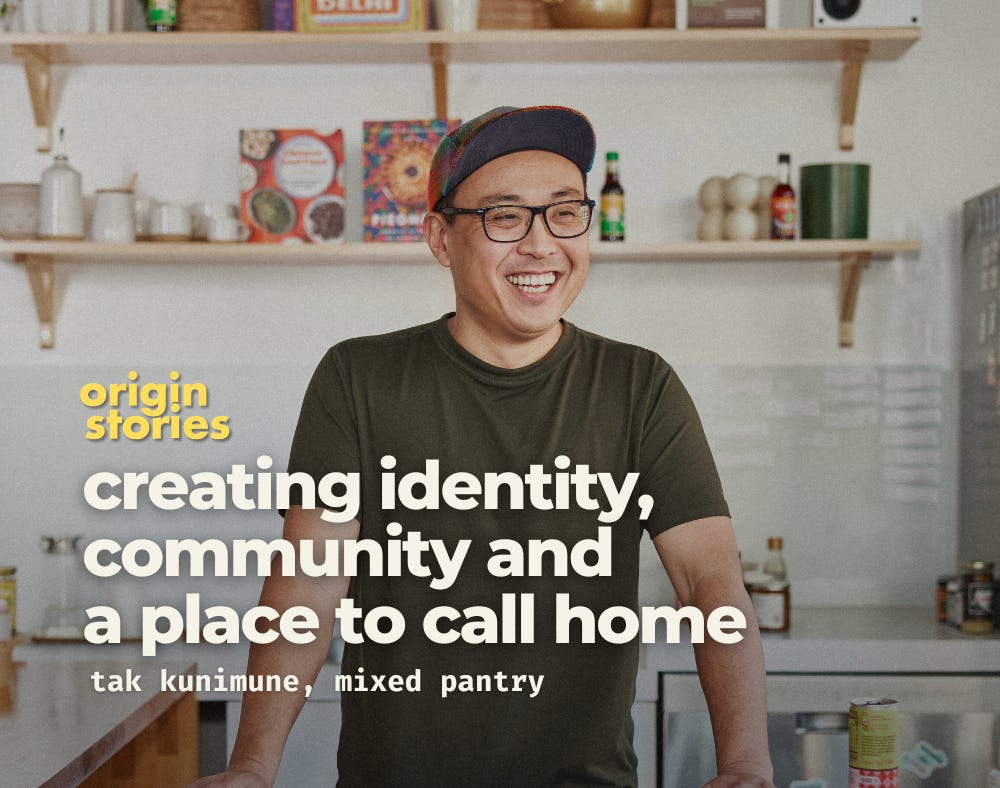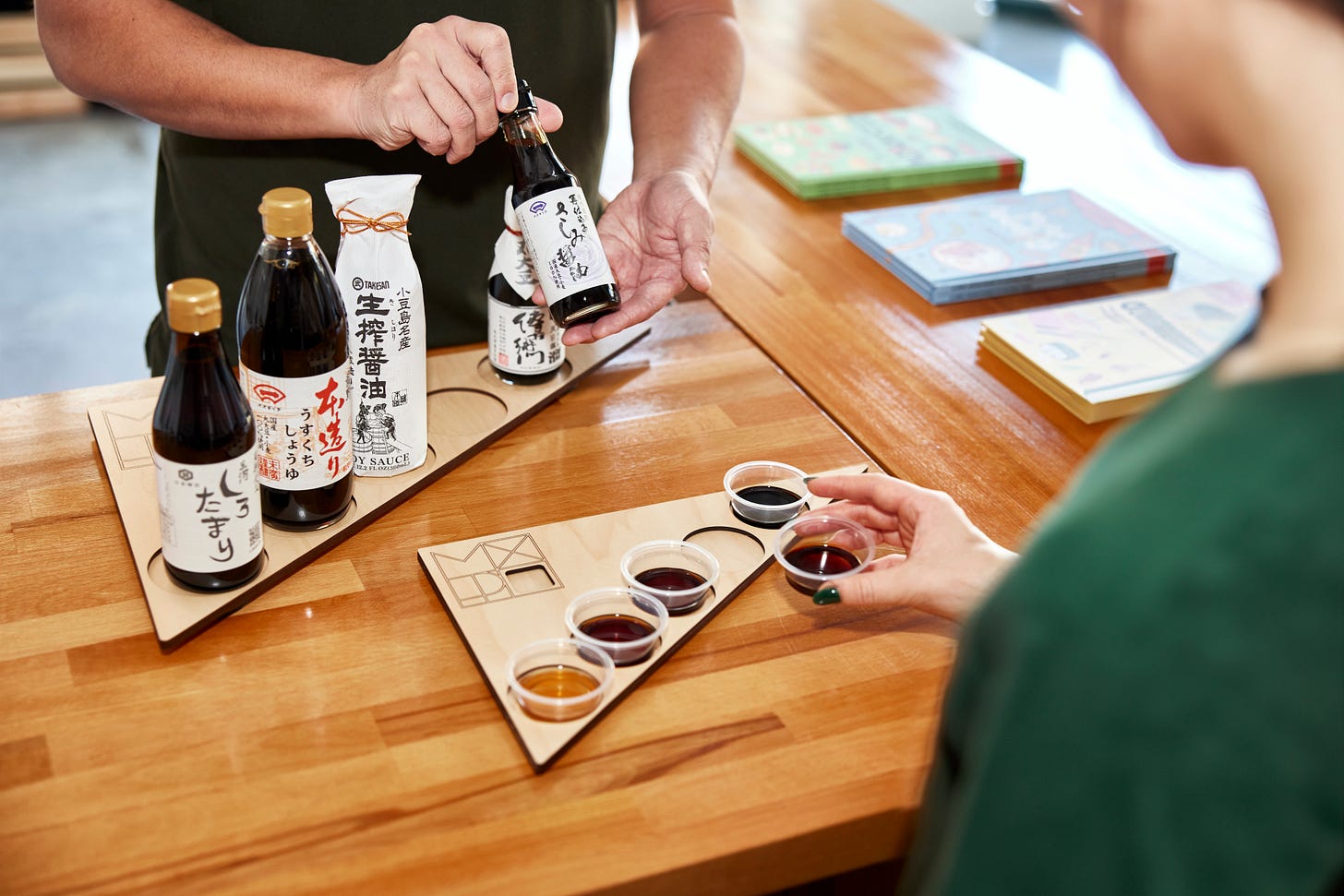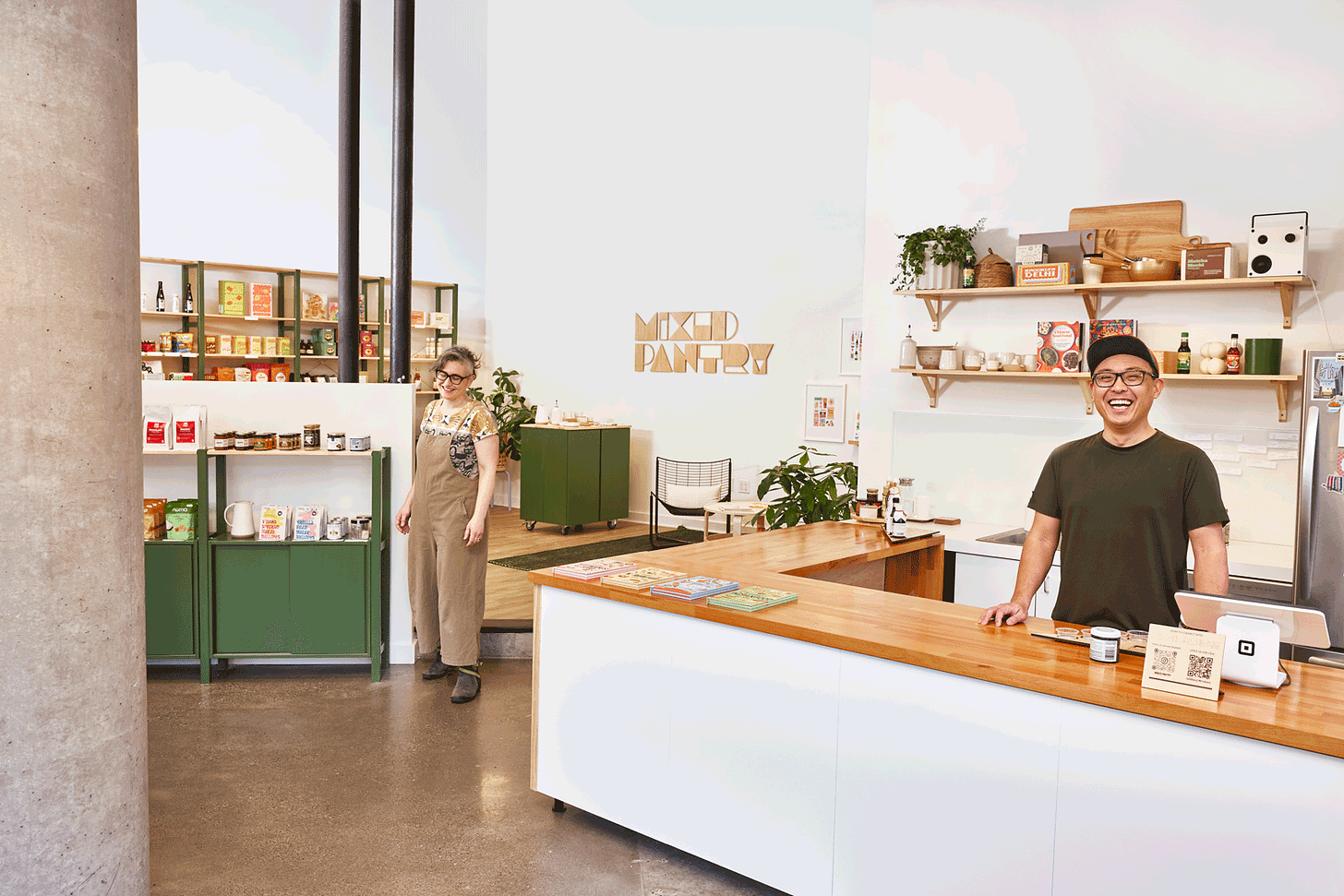creating identity, community and a place to call home with tak kunimune
Located in Belltown Seattle, Mixed Pantry is a space to explore identity and find a sense of home through food and community
Born and raised in Japan, TAK Kunimune moved around a lot—switching schools three times, just in elementary school. But being a kid who was always interested in connecting with others, he discovered the best way to make friends: food.
No matter where he went, the love of candy and the ubiquitousness of Asian food brands was universal, and something he discovered could connect people, whether rich or poor.
Moving to Oklahoma for college in 2000, he quickly learned that so many things he thought didn't exist—cowboys, hippies, and racism—still existed in post-9/11 America. And what was already an incredibly isolating and lonely experience being in a new country, having to start all over, far away from loved ones, became even lonelier.
After studying the science of beer bubbles, TAK went on to work in food—for a brewery in Oregon and a seafood company in the Bay Area. But after he saw the power of social media in helping him stay connected to friends and loved ones after the devastating Tōhoku earthquake and tsunami in 2011, he embarked on a 10-year journey at a tech company in its early days, where he learned a lot but ultimately burned out.
After moving closer to his wife's family in Seattle, he took a break to focus on family, where he rediscovered his identity and passion. Fueled by the realization that his mixed-race Asian American daughters would have different experiences than his, he was inspired to create something for them and, ultimately, for himself, too.
TAK Kunimune is the founder of Mixed Pantry, a specialty grocer offering a rotating selection of Asian and Asian American food staples, consumer packaged goods, and regular tastings and pop-up events.
This is how TAK Kunimune created a place to call home for himself, his daughters, and his community from nothing.
Do you feel your particular experience being an Asian immigrant in Oklahoma, post 9/11, contributed to how you feel about your identity and the concept of being "Asian American"?
100%. I didn't have any protective layer. I was like a newborn, like a little Asian newborn baby, right? I didn't know that I was gonna be the target of racism at all. And when you start hearing all these different things and being treated negatively all the time, you begin to believe it.
I started to have major self-esteem and self-confidence issues because of it. After years of therapy, I still struggle because of those two years in Oklahoma.
I think I have a complicated relationship with my own identity and what it means to identify and define myself. Because once you define it, it becomes tangible. And I'm really kind of afraid of doing that at this point.
That whole experience really formed the early days of my ethnic identity exploration journey. Then, I moved to Oregon and took an ethnic study class out of curiosity. I don't remember exactly why I signed up for it, or maybe it was part of a general study, but it was a fantastic class. I got to talk about my struggle and openly share my struggle as an Asian immigrant. I also shared that I felt a barrier between Asian immigrants and Asian Americans and all these different things.
And I felt extremely bad for sharing that in front of the entire group of people in the class, right next to other Asian Americans, especially when they were talking about how they want to live in harmony, and we're buddies and all these different things. But that was not what I experienced. My first years in this country were really tough for me from an identity perspective.
So now, with my kids here, I'm trying to find ways to connect as an Asian immigrant parent with Asian American kids who are mixed race. And I remember what my college friends would tell me about their immigrant parents—how the way they do things is different and how it's really difficult to connect with them—and I don't want that to happen with my daughters. I love them, and I would do anything to communicate with them. So, I created a space to talk about identity and culture.
Before you started Mixed Pantry, you were doing something similar. What led you to start Hyphen Market and then double down with Mixed Pantry?
It hit me that my mixed-race Asian American daughters would have different experiences than my own, so I wanted to create something inclusive for them. My neighbor, Young, approached us and asked if we wanted to do something together. So we started thinking about what we could do—pop up as a bento place for farmers market, karaage, a little window stand, or something like that.
Then we came across Seattle Restored and got a grant for a pop-up retail store called Hyphen Asian Food and Culture. Hyphen ultimately served as a prototype for us to test various concepts and paved the way for the launch of Anyoung Super (located inside OHSUN Banchan) and Mixed Pantry.
Originally, Hyphen was only to be open for three months, but we did well. The community and the landlord responded well, and everybody seemed to appreciate what we were doing. So, we got the maximum extension for nine months. But at the end of the day, it was a pop-up, and there was an end date, so we had to finish it and figure out what to do next.
So, at the end of the lease, we decided to go in different directions for various reasons—I chose to stay in the same spot, with a greater focus on food. Through Hyphen, I found my passion was not just “food” but how food could delight and bring people together.
I enjoy seeing the delight on people's faces when they try a product that reminds them of something. One guy came in from Vancouver, and we chatted and tasted different chili crisps, spreads, and jams and when he tasted Rooted Fare's Black Sesame Crunchy Butter, he started to tear up.
Rooted Fare would love this.
I also talked to Ashley and Hedy (Rooted Fare cofounders) about it and said, "Yo, this guy grabbed two jars from me. He started crying, and I just hugged him." They were excited to hear about it. This is important, and I'm honored, humble, and grateful for the opportunity to share some of these wonderful items that nobody knew existed.
So it's the second time around. You've done this before and have relationships with existing vendors and the community—it should be easier this time, right?
Honestly, I'm not sure if things get easier with experience. I constantly doubt my decisions and priorities. I've made so many mistakes, and it's exhausting! Social media can paint a misleading picture; the reality behind the scenes is often quite different.
I opened Mixed Pantry in November. We had about two and a half months to knock down walls, clean everything, remove the floors, and scrub the floor. We assembled, sanded, and sealed all sorts of different IKEA furniture and ran out of budget while doing it. So I was like, fuck it. We're going to open halfway.
But when we started planning our purchasing, we only had eight months of data from Hyphen—January to August. So that meant we didn't have any holiday data from last year. And many people thought we were completely closed—people still come in now and are like, wait, you guys are open again? So it was practically a restart in so many different ways. But yeah, we opened in November, and then in December, my wife got laid off, and January was pretty shitty. On a particularly cold day in January, I made $10 in sales. It was so absurd that I couldn't help but laugh as I closed up for the day.
It's a struggle, a difficult one. It's never been easy. At this point, I haven't paid myself a single penny for over a year. And it's a big struggle in a lot of different ways because, with the store, I’m so busy I can't even go back to Japan since we're not necessarily making enough to be able to hire people yet.
We can pay rent, but we are reinvesting the rest back into the business right now to have a stronger core and try to advertise our events so that vendors have a better time. Those are my priorities, and although it’s been a big struggle, I think we’re doing the right thing, so we're going to keep doing it.
When did things start to click into place? When could you see the vision of it all coming together?
This is an interesting question. From a business standpoint, I can't say I've experienced that defining moment with my physical store, but I have certainly felt a sense of accomplishment in bringing people together.
The store is more than just a physical space. I think real success lies in the connections it fosters. When my daughter expressed her desire to assist me in the store, it filled me with joy and pride. And when I see artists and customers collaborating, I know I'm doing something meaningful. Those little daily moments are what truly matter to me.
It would be a lie if I said it's been easy. But I'm genuinely proud of the choices I've made, and I'm humbled and honored by the love and support we've received from everyone.
I feel like I can move more confidently and have a clearer vision and mission for Mixed Pantry, which makes it much easier for me to serve the communities. I value individual engagement and connection with the community members and the people around that store. And want us to be a part of our local neighborhood too. It feels like we are building a strong foundation for a long-term business.
You talked about learning things, like asking for help. Was there a moment, something someone said to you, or maybe someone pivotal to you at this point?
Two regulars convinced me of the value of seeking help from our community. Initially, the idea that people would want to help me was a shock—who wants to help ME?! What's more, as I was navigating somewhat uncharted waters, I often felt unsure about what to ask for.
We sample practically every item and exclusively feature products imported from Asia or made by Asian communities to highlight and celebrate diverse Asian culinary cultures. Since the store concept is unique and important to get right, I've been cautious and protective of what we have.
But these folks helped me realize I could create a safe structure and boundary to experiment with volunteers and regulars. I'm getting to know these folks, helping others grow, and building a stronger community.
That said, these things are easier said than done, so I'm starting small—from getting some help at the cash register during a busy event to bringing back incredible hidden gems during their travels back home, I'm getting to know the people within our community one event and one spoonful at a time.
Your concept is reminiscent of those old-timey general stores that have certain wares, but you can also order from them. You mentioned that some people say, “Hey, I'm looking for this, or I'm trying to find this sauce; you got to have this sauce.” And you're like, “Okay, I'll go find it.” There’s something new every time.
It's been interesting to look for new items, whether a customer's request or something else. I have three things I tend to do when looking for new items:
A general category revamp—Currently, I’m resetting our chili crisp selection as a category since it’s been the same for a while.
Looking at a specific culture’s cuisine—A few months ago, I looked into Korean food and found Queens in San Francisco and Potluck in Boston—both were great.
A deep dive into a different metropolitan Asian diaspora—last time, I chose Chicago, and it’s so cool to see all the different types of foods, styles, and things going on in every city in this country.
Your journey may seem random, but it feels like you’ve always followed your heart in your search for something more profound. Mixed Pantry seems like a culmination of your love of food, curiosity, and desire to build connections.
You're absolutely right. Looking back on my journey, I have always been interested in connecting with people. I might have mentioned this on the Seattle Restored podcast, but I grew up poor. My parents are very proud, but like me, they did all the right things but didn’t make money.
So we had to move around a lot, and then I went to three different elementary schools. But wherever you go, whether rich or poor, the candies and packaging are all the same across Japan. Even in Oklahoma, you could still find a little bit of Asian consumer packaged goods, and that gave me a sense of home.
That's probably part of why I gravitated toward food science and eventually did Mixed Pantry and these deep dives in different cities to learn more about them and connect with the producers. For example, I can get a whole slew of Asian staples from all these different places and then ship them anywhere in the States. And that is such a powerful business model.
But you're right. Connection has always been what I craved and what has guided my journey.
It seems that as much as this is the story of how you created Mixed Pantry, it is about your search for identity, community and home.
I'm realizing that from my kids because how they get excited about Japanese food is slightly different from how I grew up. And what the Japanese food is here is very different from what's available in Japan.
Even though our identities are very different, we can still find commonality and connection. As long as there is a place and structure where we can understand each other, and even if we are making slightly different things, we can still share things together. And that's beautiful, absolutely beautiful.
I don't want anybody else to go through the identity crisis I did. And if I could create a space where people can come in and explore their identity through food and community, then it's worth it.
Learn more about Mixed Pantry: Website / Instagram / Google / Yelp







